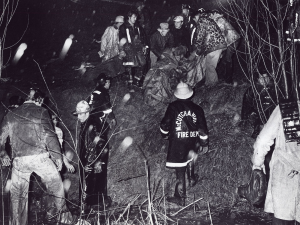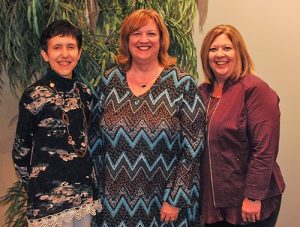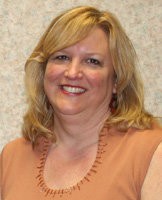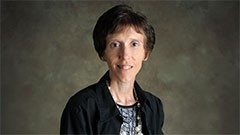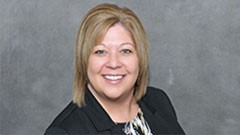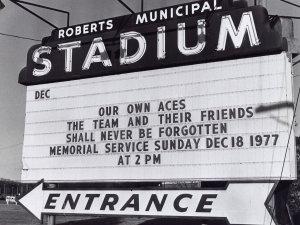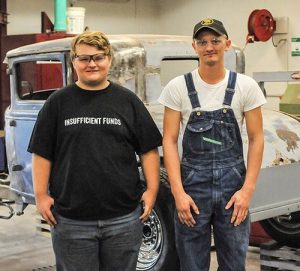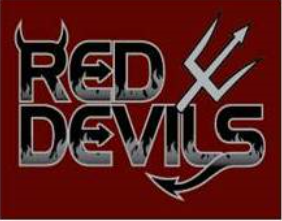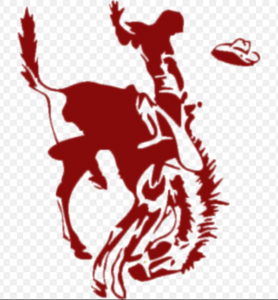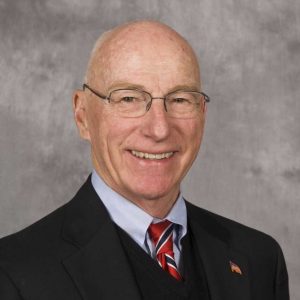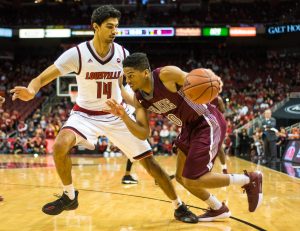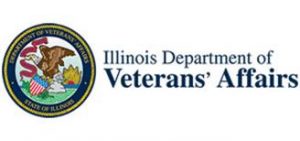(Editor’s Note: Tomorrw– December 13 — marks the 40th anniversary of the plane crash that killed the entire University of Evansville basketball team. Three players from Southern Illinois — Mike Duff and Kevin Kingston, of Eldorado and Greg Smith, of West Frankfort — died in that crash.
In 2007, as publisher of Southern Illinois Sports Connection Magazine, I wrote a story about the 30th anniversary of that rainy, dreary and tragic day in 1977, the 30th anniversary of the Evansville disaster. I spent more time and more effort on that story than anything I’ve ever written, mainly because there were so many people that had to be interviewed and so many story lines to weave together. To honor those who died in the crash this is the story in its entirety. JM)
December 13, 1977 – A Day Forever Etched in Our Memory
By Jim Muir
There are moments in life that are so shocking and so surreal that they are forever etched in our minds and seared in our conscience. The memories of those events are so vivid that we can pinpoint exactly where we were at, who we were with and in some instances even what clothing we were wearing.
Think of the assassination of President John F. Kennedy, the explosion of the space shuttle Challenger and in more recent times the 9-11 terror attacks.
The same can be said, particularly for area sports fans, about the date Dec. 13, 1977 – the day that the entire University of Evansville basketball team died in a fiery plane crash less than two minutes after take-off from Dress Regional Airport, in Evansville. In all 29 people died in the crash including 14 players, head coach Bobby Watson, one trainer, two team managers, the school’s sports information director, a longtime radio sportscaster, the assistant athletic director, three crew members and two airline officials.
Three members of that team – Mike Duff, Kevin Kingston and Greg Smith – were Southern Illinois high school basketball standouts that had thrilled fans with their athletic abilities. All of Southern Illinois was proud that the three area players had taken their considerable skills to Evansville, who had just made the move to Division I basketball.
Following news of the crash the sense of loss and the grief throughout Southern Illinois during that Christmas season was immeasurable. On the 30th anniversary of that event and to honor those who died Southern Illinois Sports Connection looks back at that fateful, foggy night through the eyes of six people that were intimately entwined in the lives of those who perished.
A Young Reporter and the Story of a Lifetime
On the night of Dec. 13, 1977 Rich Davis reported to work at the Evansville Courier & Press expecting it to be a typical Tuesday night.
Davis had worked at the newspaper for four years covering hard news stories but said nothing had prepared him for what he would experience that December night.
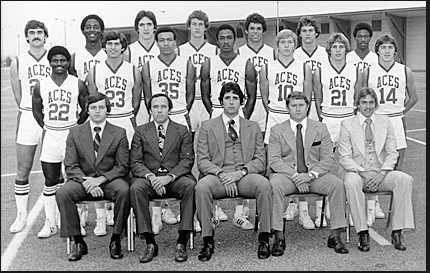 Davis, now 58, still works at the newspaper and recently recalled the events of that night three decades ago. Davis remembered that word was received in the newsroom shortly after 7:30 p.m. that a plane had gone down near the airport.
Davis, now 58, still works at the newspaper and recently recalled the events of that night three decades ago. Davis remembered that word was received in the newsroom shortly after 7:30 p.m. that a plane had gone down near the airport.
“The first indication was that it was a commercial flight,” said Davis. “Nobody even suspected it was the Aces because they were supposed to fly out at about 4 p.m. but we didn’t know then that the foggy conditions had prevented their charter flight from arriving from Indianapolis. Even when we got to the sight and started making our way toward the wreckage we didn’t have any idea.”
The plane had taxied down the runway at 7:21 p.m. and less than 90 seconds later crashed in a hard-to-reach area east of the main runway near Melody Hills subdivision. Davis and two other reporters headed to the scene. He described the weather conditions as “miserable, just terrible.”
“I really don’t remember it being that cold but it was just a misting rain all day long and very foggy, a pea-soup kind of night,” Davis said.
The three reporters traveled as far as they could by car until they encountered a dead-end street. At that point they exited the vehicle and what Davis described as “an odd event” took place.
“We were standing there trying to figure out how to get to the crash site and by then there was security everywhere and from out of nowhere this kid walks up to me, he couldn’t have been more than 10 years old, and says ‘Mister, I can get you down there, I know how to get there.’ So we start following this little boy through brush and thicket and woods and there was mud everywhere,” Davis recalled. “When we got down there the plane had actually crashed in a ravine by a railroad track. As we got closer I could see the tail of the plane up on this ridge above us and there were still some small fires. When we arrived they had already started trying to recover the bodies.”
Even as he made his way to the wreckage Davis still believed the crash was a commercial jet.
“When we got close enough I saw a bunch of Aces’ duffel bags and tennis shoes scattered everywhere,” recalled Davis. “It would have been horrible regardless, but when I realized it was the Aces I just had this overwhelming feeling of grief.”
Davis explained that the 1977-78 basketball season was a milestone for the Evansville program as they made the jump to Division I for the first time. He said the Aces enjoyed unrivaled stature in the community due in large part to winning five Division II national championships during a 12 year span under legendary Coach Arad McCutchan.
Davis said one particular moment stood out that night during the recovery of bodies.
“Because of where the crash took place the only way to get the bodies out was to bring a train in,” said Davis. “It was very foggy and I still remember the light of that train cutting through the fog and the misting rain and when they blew the whistle I remember how mournful it sounded. They transported the bodies from there downtown to a makeshift morgue.”
Davis said on a national scale the grief associated across the nation with the 9-11 attacks was comparable but regionally he has never encountered – and he doesn’t expect he ever will – any story as devastating as the plane crash.
“As the horror of what happened took hold the entire community was just absolutely devastated,” said Davis. “That night I was so caught up in it that I didn’t have time to even think about what had happened. It was just surreal. The grief was everywhere because people just couldn’t comprehend something of this magnitude. I mean, in one horrible moment this city lost something very, very special. The coach, the team … everything was just wiped out that night.”
Diamond Avenue and U.S. Route 41
Marie Kothe was a senior at the University of Evansville on that tragic night 30 years ago. Kothe, who ironically works at Evansville Regional Airport (formerly Dress Regional Airport), said the details of the plane crash are just as fresh today as they were in 1977.
“I had just gotten out of a night class, it was a nutrition class, and was driving home when I heard on the radio that the Aces’ plane had crashed,” said Kothe. “I remember that I was sitting at a red light at the corner of Diamond Avenue and Route 41. I was immediately in a state of shock. I remember looking over in the direction of the airport and it was cold and rainy and dreary. I drove on home but I don’t remember the drive. I remember staying up all night watching television.”
Much the way reporter Rich Davis remembered it, Kothe said the grim reality of what had happened and what had been lost didn’t sink in for a few days.
“When they started announcing names and I could put a connection with the names it was worse,” said Kothe. “The word that comes to mind when you talk about the community as a whole is stunned, I just think the entire city was walking around stunned about what had happened. I don’t think I even cried for a couple of days and then all of a sudden it hit me about what had happened.”
Kothe has worked at the airport for four years and noted that the plane crash was on her mind even when she applied for the position.
“I mean you can just look across the field there,” said Kothe pointing in the direction of the crash site, “and you automatically remember what happened. The people that were here in Evansville will never forget that night.”
A Coach Remembers
Aside from family members perhaps nobody had more connection to the three Southern Illinois athletes that died in the Evansville plane crash than Bob Brown.
A legendary high school player at West Frankfort in the late 1950s and early 1960s Brown played college basketball at the University of Illinois. He still holds the single game scoring record at West Frankfort, a 52-point explosion against Herrin where he scored 29 points in the fourth quarter.
Brown took over as head coach at Eldorado during the 1972-73 season and coached at the Saline County school for five years, compiling an impressive overall record of 121-30. During that span Brown coached Kevin Kingston two years and coached Mike Duff three years. That five year span included two unbeaten regular seasons and three trips to the Elite Eight, played in Champaign during that era. In 1975 the Eagles finished fourth, were beaten in the quarter-finals in 1976 and then returned in 1977 to finish in third place.
“Every year I was at Eldorado was very special,” Brown said. “Those kids worked so hard for me, they were just warriors.”
Brown’s oldest son, Mike, was born during his coaching days in Eldorado and was named after Duff, he said.
“I loved the kid (Duff),” Brown said. “All three of these young men were the kind of guy you’d want in a foxhole with you.”
Along with his association with Duff and Kingston Brown, because he is a native of West Frankfort had known Greg Smith also and was even instrumental in helping him secure a basketball scholarship to Evansville. Smith had already committed to attend Millikan University but changed his mind after Brown lobbied Evansville Coach Bobby Watson to give the West Frankfort standout a scholarship.
“I’ve thought about that often,” said Brown. “I had a part in him (Smith) going to Evansville. That was tough to take.”
Following the 1976-77 season Brown left Eldorado and took a coaching job at West Frankfort. Like all those involved in the tragedy he remembers distinctly where he was at when he heard the news about the plane crash.
“I was still living in Eldorado and when I was driving home that evening, I never will forget, I was driving through Galatia I heard something about a plane crash on the radio, just bits and pieces, there was no real details,” said Brown. “When I pulled into my driveway my wife ran out to the car and I knew something serious had happened. I immediately started making phone calls to see if anybody had survived. It was difficult to get all the details. You have to remember that in 1977 it wasn’t like it is now with cell phones and cable television.”
Even 30 years after the plane crash Brown still gets emotional when discussing the death of Duff, Kingston and Smith.
“I’ve never in my life experienced something as devastating as this,” said Brown. “It took a lot out of me and to be honest I was never quite the same afterwards. I mean these were kids that were hard workers, disciplined, intelligent and they had their entire life in front of them. It was just hard to believe that something like this could happen. The absolute toughest thing I’ve ever had to do in my life was go to those three wakes that week.”
A wake for Duff and Kingston was held at the Eldorado High School gymnasium (later named Duff-Kingston Gymnasium), Brown recalled. He said it was a fitting tribute that the two players be memorialized together but he also found it to be a cruel irony.
“Here are these two caskets on the same basketball floor where we had all these wonderful moments and memories,” said Brown. “I just remember that the grief was unbearable.”
Brown said all three funerals were held on the Friday following the Tuesday plane crash. He said his West Frankfort team had a game scheduled with Harrisburg on the night of the funeral and after consulting with the Smith family it was decided to play the game.
“We were not very good and hadn’t won a game at that point in the season,” said Brown. “I showed up and I tried to talk to my team but I just couldn’t do it. We ended up winning the game, I don’t know how, but we did somehow. I can honestly say that coaching just wasn’t the same for me after that plane crash.”
Brown said he often thinks of Duff, Kingston and Smith, and not just near the anniversary of their deaths, and even has a portrait of the three players in his living room. Brown said he believes all three would have been successful as adults.
“I think Duff would have played in the NBA, he was that good,” said Brown. “I believe Kevin would have been a high school coach and with his work ethic would have been a great coach. And as intelligent as Greg was, he could have done anything he wanted to do.”
A Phone Call from the Airport
In her words Kay Barrow remembers the details of Dec. 13, 1977 “just like it was yesterday.
Barrow, the mother of Mike Duff, was working in the Eldorado office of her husband, Dr. John Barrow, a well-known orthopedic surgeon. She said she remembers a late afternoon phone call from Duff, the last time she and her son would ever talk.
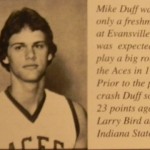 “Mostly I remember that he was happy that afternoon,” Barrow said. “He called to see if we were going to make it to the game the next night and he also told me that their flight had been delayed because of the weather. It was just a typical conversation but the main thing I remember is that the last time I talked with him he was happy.”
“Mostly I remember that he was happy that afternoon,” Barrow said. “He called to see if we were going to make it to the game the next night and he also told me that their flight had been delayed because of the weather. It was just a typical conversation but the main thing I remember is that the last time I talked with him he was happy.”
Barrow said she heard the news about the crash while listening to an Eldorado basketball game that night.
“It was just one of those moments in life when you just don’t want to believe what you just heard,” she said. “We started calling people we knew in Evansville trying to find out the details, looking back it was just surreal. It was just a short time after we heard the news that people started coming to the house trying to be with us and to help take care of us. That night and that entire week were just like a blur to me, we went around in a daze.”
Barrow said the years have helped lessen the grief but she said that December remains a difficult month even three decades after the plane crash.
“December is always a tough month and it always will be,” Barrow said. “I do anything I can, frantically clean house, put up Christmas decorations, just anything to keep my mind off of it. Christmas has never been quite the same for me.”
Barrow said there are also little, unexpected things that create a flood of emotions.
“Before the plane crash I had ordered Mike a down-filled coat for Christmas, I ordered it from an L.L. Bean catalog,” said Barrow. “The other day we got an L.L. Bean catalog in the mail and I automatically thought about that December in 1977. And it’s not just that, there are little things all the time that make you remember.”
Noting that he would now be 48 years old, Barrow said she often wonders what kind of man her son would have made. Saying that “Mike will always be 18” she said she has watched his classmates at Eldorado grow into middle age and that always rekindles memories of her son.
Duff played only four games for Evansville prior to the plane crash and the final game he played was against Indiana State, who was led by Larry Bird. Duff scored 23 against Bird in his last game, prompting Evansville Coach Bobby Watson to say after the game that Duff would be as good as Bird, who was two years older. Barrow said she and her husband met Bird a couple of years ago and the former NBA great told them that he remembered that particular game. She said they also met Magic Johnson, who Duff played with in an all-star game before entering college. Barrow said Magic also told the couple he remembered playing against their son.
“Little things like that means a lot,” she said.
Barrow said she recently had an unexpected emotional moment when she heard a story concerning Sam Clancy, a friend Mike had met while playing in an all-star game in Pittsburg the summer before he died.
“I just heard recently where Sam Clancy’s son is playing basketball at UCLA,” she said. “It’s just little things like that that brings it all back.”
A Last Lunch Date
Donald Kingston was working as an assistant basketball coach at Eldorado High School in December 1977 and his son Kevin was in his senior season at the University of Evansville. Given the rigors of both their schedules opportunities for the Kingstons to get together were few and far between.
Looking back three decades Donald Kingston said he recalls the details of Dec. 11 that year as well as he does Dec. 13 – the day his only son was killed in the plane crash. Kingston traveled to Evansville on the Sunday prior to the Tuesday plane crash to have lunch with Kevin – a lunch date that included a heart-to-heart talk. The elder Kingston still cherishes that conversation.
“Kevin worked hard for everything he had achieved, he just outworked other people his entire career,” said Kingston. “And that day we ate at Red Lobster and I told him I loved him and how proud I was of him for all the hard work and for all that he had accomplished. That was the last time I ever talked to him.”
On that fateful Tuesday night Kingston was with the Eldorado basketball team at a game at Norris City. Kingston did not ride the bus that night, instead driving his car to the game. On the return trip to Eldorado he and his wife heard news of the plane crash on the radio.
“Think about this, I was driving along and I heard the announcer come on and say that the Aces’ plane had crashed and that Kevin Kingston was dead.” said Kingston. “I’ll never forget that, you’re hoping that what you just heard isn’t true but deep down you know that it is.”
Kingston said his daughter (four years younger than Kevin) was a cheerleader for Eldorado and was on the bus. He said the players and cheerleaders also heard the news en route back to Eldorado.
“We still had to go to the gym to pick her up and she was just devastated,” Kingston said.
Kingston said instead of dwelling on the crash that took his son’s life he has instead tried to keep his focus on the outstanding career his son had, particularly the great teams at Eldorado.
“Bob Brown was a great coach, those kids would do anything for him,” said Kingston. “Those were very special times in Eldorado. Mike Duff was a great player and I believe he would have played professional basketball. Kevin didn’t have the God-given talent that some players have but he just worked so hard. He was always the best defensive player on every team he played on.”
Kingston said he also thinks often about what the future would have held for his son.
“I really think Kevin would have been a coach and I think he would have been a good one,” said Kingston. “He was a senior at Evansville and he had already agreed to stay on and work as a grad assistant the next year. He always said that he wanted to come back to Eldorado and coach. I think about that a lot.”
‘It’s with you all the time’
On a trip to Evansville in early December of 1977 to see their son Greg play basketball Art and Carolyn Smith decided to do some Christmas shopping. The Smiths bought several gifts, mostly clothing for Greg, a freshman point guard for the Aces.
Carolyn said the clothes she painstakingly picked out for Greg during that shopping trip were never wrapped.
“We ended up burying Greg in those clothes,” she said. “I think about that every single December.”
Smith was a 1977 graduate of West Frankfort High School where he was a three-year starter and standout for the Redbirds. After graduation he signed to go to Millikan University but then later changed his mind and was awarded a scholarship to play at Evansville.
“Greg was so excited about going to Evansville,” said Art. “He loved basketball, he studied the game and he worked really hard to become a better player. Greg was having the time of his life at Evansville. He was more excited about getting that scholarship to Evansville than I had ever seen him.”
In 1977 the Smiths were the majority owner of WFRX radio in West Frankfort and it was a call from the station that first alerted him that something might be wrong. Asked where he was at when he learned about the plane crash Art answered immediately.
“I was right here in this room,” he said waving his arm in a circular motion around the family room. “I received a call about 8 p.m. that there had been a plane crash near Evansville but I didn’t think for a second that it was the Aces because I knew they were supposed to fly out at 4 p.m. so I figured that they were already in Nashville.”
Smith said a second phone call moments later confirmed that it was the Evansville team and within seconds Gail Borton, principal at the high school and Harold Hood, the high school coach showed up. Borton volunteered to drive the Smiths to Evansville.
“We found out where they had the morgue set up and we went there first,” Art recalled. “After we arrived, the assistant coach who was not on the plane came running over and told us that Greg was still alive and had been taken to Deaconess Hospital. We went straight there and the doctor came out just as soon as we arrived and said that Greg had died five minutes before we got there.”
Art said identifying his son’s body is the hardest thing he’s ever had to do. He also noted that it was the first time Greg had ever flown.
“They told me I could stay with him as long as I wanted and I stayed with him for quite a while. I didn’t want Carolyn to go,” said Art. “I remember after that we went down to the little chapel at the hospital and just sat there and stared at each other and never said a word. What can you say at a time like that?”
The Smiths said the loss of their son shook their once-strong faith to the core.
“We were active in church and we just quit going, we quit for 20 years,” said Art. “The church was good to us and the pastor was good, but we were angry. Thoughts of ‘why’ ran through my mind a lot. I don’t know how we would have gotten through it if it hadn’t been for our other two children. They were involved in other activities and we had to go on … I think they gave us the will to go on.
The Aces had played only four games prior to the plane crash and Greg got to see action in only the Indiana State game – the last game the 1977-78 team ever played. In all, Greg’s collegiate career spanned three minutes. Yet Art recalled him being in a great mood the last time they talked.
“He had gotten in to a game for the first time against Indiana State with about three minutes left,” Art said. “It just so happened that when he came in the game Larry Bird came out of the game. He said, ‘I guess they didn’t want me to embarrass him.’ He was laughing about that, he was in good spirits the last time we talked.”
Art and Carolyn agreed that every memory of Greg is a good one – something that has helped sustain them through the years.
“He was just such a good boy,” said Carolyn. “I can never remember one time ever that I had to get on him about anything. He tried so hard to please, he was an excellent student. He was just the type of person you wanted to be around.”
The Smiths said that the loss of their oldest son has never really lessened throughout the years.
“Even after 30 years … it’s with you all the time,” said Art. “But, it’s worse in December because all those memories come back every year.”
_____________________________________________
Did the NBA lose a future star?
How good could Mike Duff have been if he had not lost his life in the Evansville plane crash? The answer to that question from all who watched him play was that he would have someday made a living playing basketball in the NBA.
On the final game of his life, Dec. 10, 1977 Duff, only a freshman, scored 23 in a loss to highly-ranked Indiana State and Larry Bird. An excerpt from a story in the Evansville Courier & Press following the Indiana State game shows that Duff had already caught the attention of Evansville Coach Bobby Watson.
The story read in part:
“Watson, not one to give out accolades, said following the loss to Indiana State that freshman Mike Duff would “be as good as Larry Bird in a couple of years.”
Duff’s high school coach Bob Brown also believes he would not only have played, but starred in the NBA.
“There’s no question about it,” Brown said. “He was 6’7” or 6’8” and he could go inside, come outside and shoot the mid-range jumper. He was quick and smart and he would have just kept getting better. He hadn’t come close to realizing his full potential yet.”
Duff’s high school statistics are eye-popping by any standard and he still holds virtually every Eldorado scoring record.
Duff records include:
Game – 47 points
Season – 1,097 points
Career – 2,558 points
Points per game – 32.3
Rebounds game – 28
Rebounds season — 515
Career
Points per game – 25.8 (over three years)
Rebounds – 1,287
Don Kingston, whose son Kevin was also killed in the plane crash, echoed Brown’s words. Kingston was an assistant coach at Eldorado during Duff’s glory days when he led the Eagles to three straight Elite Eight appearances in Champaign.
“He had greatness all over him,” said Kingston. “I don’t think there is any question that he would have played professional basketball. I mean think about that, as a freshman in his fourth collegiate game he scored 23 against Larry Bird and Indiana State. He had all the physical skills and plus he had the determination. Yeah, I believe he would’ve played professionally.”
— Jim Muir —
—————————————–
Fate Played a Role that December
In any tragedy fate always seems to play a role but in the Dec. 13, 1977 plane crash that claimed the lives of the Evansville Aces there were several ironies that can’t be overlooked.
* McLeansboro native and current Utah Jazz Coach Jerry Sloan, who led Evansville to a pair of Division II national titles, was hired as the head coach at Evansville prior to the start of the 1977-78 season, but abruptly resigned the position three weeks later. Bobby Watson, an assistant at Oral Roberts, was hired to replace Sloan and died in the crash.
* David Lee, a teammate of Sloan at McLeansboro, had agreed to work as an assistant with Sloan at Evansville during the 1977-78 season. After Sloan resigned the position was not available to Lee, who later went on to lead McLeansboro to a Class A state title in 1984. The Foxes compiled a perfect 35-0 record and were led by Brian Sloan – Jerry’s son.
* West Frankfort standout Greg Smith had signed to play for Joe Ramsey at Millikan University and was already on campus when he was asked to try out for one open scholarship at Evansville. Smith beat out more than 20 others and won the full-ride scholarship. Smith then transferred to Evansville and died in the crash less than three months later.
* Mike Duff was recruited by virtually every college in the nation including Kentucky, Duke, North Carolina, Illinois and UCLA. Duff signed a letter-of-intent to attend Missouri and play for legendary Coach Norm Stewart but later changed his mind and opted out of the contract to attend Evansville. The fact Evansville was making the move to Division I that year allowed Duff to get out of the contract with Missouri. Like Smith, Duff would die less than three months later.
* Tom Collins, a reporter with the Evansville Courier, was scheduled to travel with the team to Nashville on Dec. 13, 1977 to cover the game against Middle Tennessee State, but his assignment was changed by his editor at the last minute and he remained in Evansville. Collins had planned to drive to Nashville the following day to cover the Dec. 14 game against Middle Tennessee State – a game that was never played.
* David Furr was a star basketball player at Olney High School and had a scholarship to play at Millikan University. Instead he opted to go to Evansville and walk on. Furr injured his ankle while trying out for the Aces but Coach Bobby Watson said that he had like what he saw from Furr and asked him to stay with the team and try out again after his ankle healed. While his ankle was on the mend Furr became the team statistician, working home games but not traveling with the team. So, Furr was lucky he wasn’t on the doomed plane that night in December 1977 and actually became the only team member to survive.
But, fate was still not through during that cruel December because Furr and his brother Byron were both killed in a two-car crash while they were driving home from a holiday basketball tournament in Charleston. David Furr was driving and lost control of the vehicle and crossed the centerline striking a utility truck head on. The accident took place on Dec. 27 – exactly two weeks to the day after the plane crash.
— Jim Muir —
